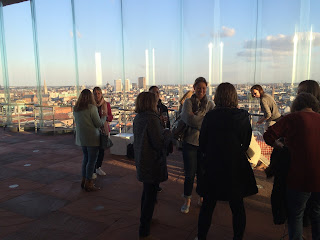3RD MEETING OF FAIR@KIT
BORDEAUX, FRANCE, SEPTEMBER 2016
(Maja Kresnik)
The third meeting of Fair@Kit
project (Media education for young children and preventing bullying) was in Bordeaux,
France.
At this meeting, we reported on the effects of the project
in each participating country by the end of the first year. We set some new
goals and activities and we confirmed the old or the new twinned groups of
countries.
This year, the focus will be on better ties of friendship
and resolving interpersonal conflicts. We will also focus on identifying and
talking about bullying. We will try to
resolve bullying in the group and prevent bullying with the media.
During the visit, we visited the kindergarten and primary
school. So, we can see their educational system. After the visit, I came to
realize, that their system is much more rigid than our, because the teacher
does not allow a lot of freedom in their work. The groups have a large number
of children, which teaches only one teacher. Another adult could only help in
the care of the child. in this way the difference between the two adults who
work with these children, is becoming even bigger.
Maja Kresnik
Slovenia
REPORT ABOUT FAIR@KIT MEETING
Bordeaux, France, september 2016
(Marko Močnik)
For the 3rd Erasmus+ meeting was
chosen Bordeaux in France. There we met in small school. Franch pre-school
sistem is different (maybe only for me) from others because it has schools for
children between 3 and 6 years old. (So it considers lectures and lessons, not
only playing and learning with playing or other ways of spending time before
afternoon.) We were there for three days, we had workshops, lecture and we
visited groups in this and nearby elementary school.
First we told each other what we
have done in our kindergartens, how we disseminated our project and what are we
going to do in the future. Sometimes things are not attractive, but they put
you back on track to work and think about the project. You promise you're going
to do some things, take ideas from others and find solutions.
Secondly,
Mrs. Laura Repo, an expert from Finlnad, was talking about different types of
bullying and it's victims. She showed us a film about a group in kindergarten
in which one boy has bullied another boy. We had a discussion in which I
presented examples from my last year group. Film showed us an interaction that
we probably have seen before, but rare have discussed about it. Sometimes
bullying just happen, probably even in our own groups, but we don't notice it.
Results comes in years following, because bullied children have lower self
respect, but those who bullied also suffer social disconnection and are more
likely to become active as criminals or violent people. I was talking about a
boy, who was violent towards others, especially girls. I invited his father to
have a discussion. But father came to argue with me or with a boy, to punish
him even more he did it before, so I found out that problem was not in a boy,
but in his experiences with his father. I belive, we have to work hard to
notice such behavior and try to help them get out of wrong social behavior.
Finally, I would like to express my
toughts about french pre-school sistem. I was really interesed observing the
lesson. Little children silently
followed the lecture with a high rate of attention, that nobody wouldn’t be
ashamed of. I liked that kind of work, because I am a profesor and I work
similar at home. I belive in idea, that childreen should achive some level of
readiness to following the school work, otherwise entering into school sistem
would be harder for enyone. There are countries that belive you can learn
mostly through playing, but do you think I learned how to change a wheel by
playing?
I was
watching film about Caribean tribes. Children were doing things with parents,
they were fishing together, cooking together and parents were teaching children
how to do every day works. Can we teach about the traffic without being part of
it? Can we teach cooking through games and toys? I belive young people need
experiences from real life to get to know what they need, to do what they want
to do, because we want to prepare them for real life (maybe even before 30s ;)
).
Of course this was only one part of a classroom and
children were playing too. Toys were similar to ours. Playground world was
quiet poor and they probably don’t walk a lot, like we in Slovenia.
As I saw, relation between the teacher and teacher
assistant is reduced on minimum in France and assistants are more or less just
cleaners and food servants. I think that our sistem of more or less cooperation gives better life
model for children as well.
Marko Močnik
Slovenia



































































